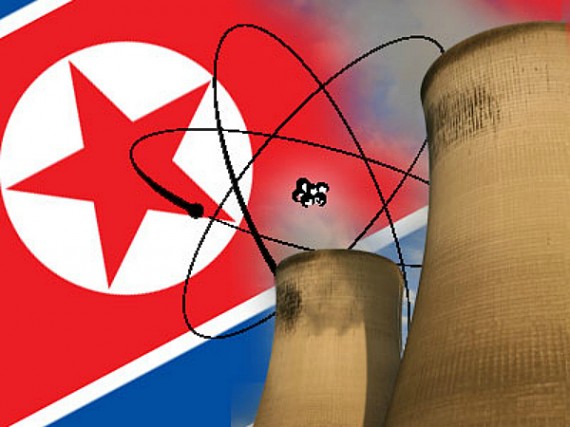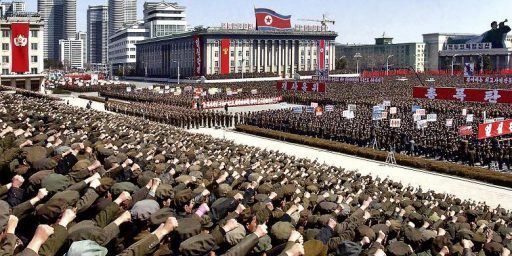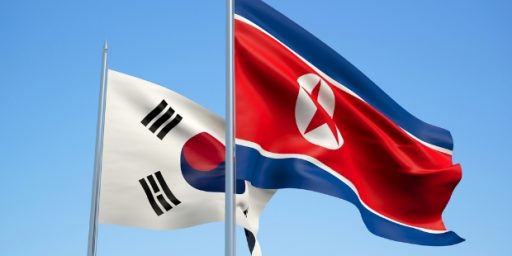North Korea Nukes Here To Stay
North Korea's nuclear weapons aren't going anywhere.
North Korea has largely faded from the headlines after this spring when the spent weeks heightening tensions on the peninsula by cutting off communications with allied force and South Korea designed to prevent accidental military exchanges, closed access to a factory jointly operated with the south, and engaged in a third underground nuclear test. The issue of North Korea, though, never really goes away, and was likely a large topic of conversation between President Obama and Chinese President Xi during their recent summit in California. Despite all of the talk, though, some experts are starting to come to the conclusion that there’s little that the United States can do about North Korea’s nuclear program, at least as long as the Kim regime is in power:
A number of independent U.S. analysts are saying the Obama administration appears to be reluctantly accepting that the North Korean military might never be fully denuclearized.
Since the last round of regional nuclear talks in 2008, the North has substantively advanced its nuclear weapons program — carrying out two underground atomic tests; launching several long-range rockets, one of which made it into space; showing off a prototype for a road-mobile ICBM; declaring a uranium enrichment program; and initiating efforts to reopen a disabled plutonium production reactor.
All of this illustrates, according to some issue experts, just how much ground has been lost in nearly five years of unsuccessful international efforts to resume negotiations on an end to Pyongyang’s nuclear program.
U.S. Secretary of State John Kerry last week in an appearance with his South Korean and Japanese counterparts in Brunei told journalists, “We join you in making it absolutely clear that the policy of the United States, together with the Republic of Korea and Japan, is the denuclearization of … North Korea.”
The Obama administration has shown little interest in responding to recent overtures by Pyongyang asking for unconditional bilateral security talks. Washington has said it is willing to return to the six-party aid-for-denuclearization talks, but it has qualified that on the requirement that North Korea first demonstrate a willingness to halt its prohibited weapons work. The six-nation talks also involve China, Japan, South Korea and Russia.
While the U.S. demand would seem to represent proof that the Obama team would not accept continued North Korean nuclear arms work, some analysts say maintenance of the status quo, without talks, suggests Pyongyang’s military efforts simply will proceed forward.
Victor Cha, the Bush administration’s former special envoy for North Korea policy, in an e-mail said he does not see an explicit policy shift on the part of Washington. However, “having said that, a policy of non-action on the diplomatic front, with everyone sitting on their hands, is tantamount” to acquiescence of Pyongyang’s nuclear weapons program, he said.
“Objectively, the North Koreans are just making progress and as the North Korean program advances, I suspect that — particularly in the U.S. and South Korea and Japan — there is a declining confidence that we will be able to get them to bargain it away,” said Jeffrey Lewis, director of the East Asia Nonproliferation Program at the James Martin Center for Nonproliferation Studies.
“I wouldn’t represent it as a kind of [policy] discontinuity. It isn’t that something changed overnight. It is that there has been this gradual accumulation of North Korean capabilities,” said Lewis, who writes for the Arms Control Wonk blog and Foreign Policy magazine. “I think when they came into office, [Obama administration officials] were in this whole benign neglect mode. They didn’t press very hard and the North Koreans went kind of crazy with the tests.”
Pyongyang has signaled that its plan in any new diplomatic talks will be to attain some form of recognition of its status as a nuclear-armed nation, according to observers.
“Part of North Korea’s diplomatic strategy is working — carving out a space where it’s tacitly accepted as a nuclear weapon state,” said Joel Wit, editor of the website 38 North, at an event at the American Security Project in late June.
“To me, all of this is leading to a reality, whether we want to acknowledge it or not, that we are acquiescing to North Korea as a nuclear power,” argued Wit, a onetime State Department official who, in the 1990s, supervised an ultimately failed U.S.-North Korea denuclearization accord.
(…)
“In the past, we were negotiating with the North Koreans to freeze their program and give up things they hadn’t yet built,” such as a uranium enrichment capability and longer-range ballistic missiles, Lewis said. The negotiations inevitably always stumbled when the United States and its allies pushed Pyongyang to dismantle or surrender nuclear weapon technology it already possessed, he said.
Now that North Korea has advanced its weapons of mass destruction efforts so much, the prospect of getting it to agree to permanently give up all of its new capabilities seems even more remote, according to Lewis.
“The old formula of freezing the program just looks less appealing,” he said.
In the end, though, I have to wonder what the alternative actually is. From the beginning, the North Koreans have proven themselves to be quite intractable to any pressure, even from their Chinese patrons, on the issue of abandoning their nuclear weapons program. Yes, it’s true that they haven’t been above using that program, or to be more precise negotiations about that program, as incentive for getting something from the West such as food aid and such. Because of those needs, we’ve been able to negotiate the temporary freezes noted above which, in the end, haven’t really stopped the inexorable moves that North Korea has been making toward developing a nuclear arsenal. Throughout all the talks and bluster and freezes, though, there’s never been any indication that Pyongyang would ever really be willing to give up its basic nuclear weapons research program and, now that it has them, its nuclear weapons. And, when you think about it, there’s no rational reason why we should expect that it would.
The last ten years or so have taught the world a few very important things about American foreign policy. In 2003, we invaded Iraq and brought down the regime of Saddam Hussein, who had given up large scale WMD research years before. Several years after that, Libya’s Muammar Gahdaffi, apparently motivated in no small part by what happened in Iraq, gave up his nations WMD program largely voluntarily, apparently believing that doing so would help keep him in from becoming a target of the West. It helped for a while, of course, but when the Arab Spring came and a rebellion sprang up in Libya, it didn’t take long for the same nations that Gahadffi had made a deal with to turn around, side with the rebels, and work to bring about not just his downfall but, in the end, his death at the hands of an angry Libyan mob. Contrast that wth the way that the West has handled Iran and North Korea, both of whom have active nuclear weapons research programs. Yes, there are other factors regarding both nations that make direct military confrontation both more difficult and less likely, but one cannot deny that the presence of a nuclear weapons program and, in the case of North Korea actual nuclear weapons, does have an influence over how the U.S. and the West deals with a given nation.
Given the above, I have to wonder why anyone would expect that North Korea would give up its nuclear weapons, or why Iran would abandon its research program designed to obtain them. The past decade shows them that nations without nuclear weapons get invaded and their leaders get deposed while nations with nuclear weapons, and more importantly their leadership, become relatively safe. Perhaps some day North Korea will be nuclear-free, but it’s not going to happen as long as the current leadership is in control.







Important to point out that those factors predate either country’s nuclear program…
The only thing we should actually be worried about is that they will go somewhere.
Now, how about Iran? What about the “line in the sand”?
Those other factors make a military confrontation suicidal. Iran holds a large chunk of the worlds oil supply hostage (straits of Hormuz), hence the world economy, and North Korea holds Seoul hostage. Neither regime needs nuclear weapons to do this, so I wonder what they actually get thru their nuclear programs? Prestige maybe?
@OzarkHillbilly: I think I combination of nationistic pride and an increased sense of safety.
@OzarkHillbilly:
While you are certainly correct regarding Seoul when it comes to the Straits Iran really doesn’t hold anything.
The Straits of Hormuz are really in no danger of Iranian intervention IMO provided the US and others decide it shouldn’t be. Say what you will about our incredibly dysfunctional government US Naval forces with some assist from the Air Force will keep the straits open. Again, just in my opinion.
Sure, they may have dropped the ball in other areas of East Africa but honestly I think it’s because they just didn’t care enough.
If they stay, then they aren’t a problem, are they?
The main issue was that they might relocate to downtown Seoul, wasn’t it?
😉
@Davebo: Well depending on how far things go there will be massive casualties to keep that straight open. WE have some good anti-missile systems but they can’t handle thousands of simultaneous incoming..
For Iran it’s about national pride right now and the feeling of security over Saudi Arabia. In Iran’s view Saudi Arabia is already nuclear due to Saudi Arabia’s close relationship with the USA. Also look how we treated Iraq(non nuclear) vs North Korea(nuclear).
It also helps Iran’s leadership stay in control of the populace. As long as the USA opposes even civilian nuclear power for Iran the leadership will use that to unite the country.
It seems that the PDRK has shifted policy on their nukes, and radically so. Before they were used for bargaining chips. Well, more like bait, actually, but those days are probably over.
During the Plenary meeting that was held during the height (densest smoke cover) of the last manufactured crisis, they declared their nuclear program to be the very backbone of their national defense, and this would enable the paring down of the Army in order to improve the lot of the common man. As the backbone, an official who bargains with a foreign power on the subject can be charged with treason. The implication is they will no longer even pretend to negotiate on this point. Not for food, not for anything at all. I suspect we are engaging in a little intentional denial about that, and so are the Chinese.
As long as the Chinese are unwilling to have millions of refugees on their hands, the PDRK has them by the balls, to a degree. The are gambling the Chinese will go along, however unhappily.
Sounds rash, but what are their choices? They know they can’t control the information their people receive indefinitely, probably not even for much longer at all. They must begin to transform into something that might be able to re-engage with the real world someday. The people must be in at least a fairly good mood when all this that takes place, or the lot of them stand to be strung up with piano wire, and that may be the most pleasant part of the process.
I suggest following McCreary for awhile, Doug, as a counter balance to those boys at FP. A tad obsessed with the ME, they are, IMO. http://www.kforcegov.com/Services/IS/NightWatch.aspx
Nice and concise.
Hi, I’ve been recently a lurker about your blog for a couple of months. I really like this article and your entire website! Looking forward to studying more!
N. Korea..somewhat predictable….Iran…Not so much. Rogue nation is an ideal name for them.